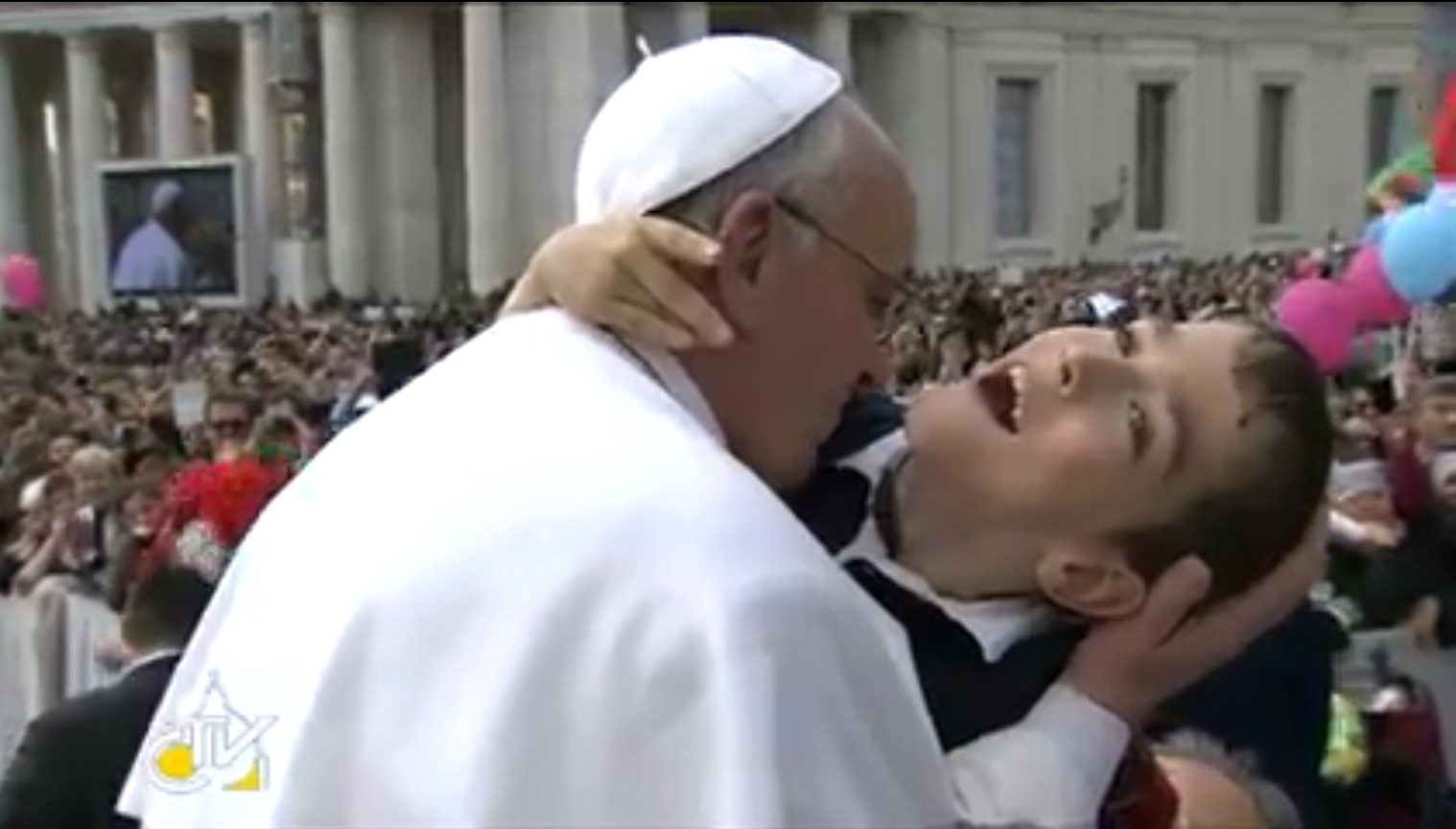A year and a half ago, we completed a major renovation project of our church. We were able to turn what was part church and part multipurpose area into one single space of noble simplicity for worship. The final product was well received. One aspect of the work has still remained, however. Several panels of stained glass were removed in order to create a new sanctuary wall. We have been trying to find creative ways to reincorporate these windows into the renovated space. Last week we found a space for some of those pieces.
In the renovated sanctuary a full length piece of translucent material was placed behind the tabernacle. The intention was to surround the tabernacle with natural light. In the end, after living with it for over a year, most of us felt that the image created was underwhelming. Thanks to the skills and ingenuity of our maintenance staff, three of the glass panels were fashioned to be inserted in the wall behind the tabernacle. The transformation was amazing, the insertion of the stained glass transformed the sanctuary. What was already a renewed place for worship was enhanced and a renewed sense of the sacred was evident.
Churches can be lavish and beautifully adorned or they can be of a simple construct, but God’s dwelling within them is no less significant. Appreciating our churches as sacred dwelling places of God also gives us an opportunity to proclaim the truth that the divine chose to dwell in the human experience. The sacred dwelling place of a church is a symbol of the temple which is the human person, first in Jesus Christ and then all of us. Like a church the human person can have profound intelligence, observable beauty, athletic skill and strength. However, the human person can also be burdened with pains, sorrows and limitations beyond endurance. God’s dwelling is no less significant in anyone of them.
Earlier this week I concelebrated the funeral mass of Patricia and Derek Ward. The previous week, Pat lost her life at the hand of her son, Derek, who subsequently took his own life. The principal celebrant of the mass was our diocesan bishop, William Murphy and the homilist was Fr. Robert Lubrano, the brother and uncle of the deceased. I have never been present for a double funeral let alone one in which the circumstances were as unfathomable as this one. I do not know how Fr. Bob was able to preach as he did, I don’t know if I could have managed to put a comprehensible sentence together.
It was one of the most powerful reflections I have ever heard. Fr. Bob preached about how his sister was the personification of Jesus’ great commandment to love. In particular, those who are difficult to love. Her career in teaching was one dedicated to the marginalized who she believed had the right to an education that would empower them to better opportunities in life. She applied that same loving effort to her son, whose mental illness and learning disabilities made it difficult for him to read. Through her steadfast love, he became an avid reader. She loved him as his mental illness grew uncontrollable and she struggled to find care for him. Over and over again, at this funeral of his sister and nephew, Fr. Bob challengingly spoke of the dignity of the human person, no matter how broken or sinful and their God given right to be loved and cared for.
 The event of Pat and Derick's death generated a great deal of media attention. In one way, I was glad that there was no media present for the funeral mass, but I also found myself wishing that the larger world, who knew of the tragedy, also had the opportunity to hear the profound words of faith spoken by a grieving brother and uncle. I therefore felt called to share what I could. In a week in which my parish community was given an renewed opportunity to acknowledge the presence of God in the sacred dwelling place of a church, I was reminded to recognize his presence in the sacred dwelling place of the human person. We must commit ourselves to acknowledging and caring for that presence in our brothers and sisters of all faiths, orientations, ethnicity, and abilities great and small.
The event of Pat and Derick's death generated a great deal of media attention. In one way, I was glad that there was no media present for the funeral mass, but I also found myself wishing that the larger world, who knew of the tragedy, also had the opportunity to hear the profound words of faith spoken by a grieving brother and uncle. I therefore felt called to share what I could. In a week in which my parish community was given an renewed opportunity to acknowledge the presence of God in the sacred dwelling place of a church, I was reminded to recognize his presence in the sacred dwelling place of the human person. We must commit ourselves to acknowledging and caring for that presence in our brothers and sisters of all faiths, orientations, ethnicity, and abilities great and small. Fr. Bob began his homily and I conclude this reflection with these words from President John F. Kennedy’s inaugural address.
The world is very different now. For man holds in his mortal hands the power to abolish all forms of human poverty and all forms of human life. And yet the same revolutionary beliefs for which our forebears fought are still at issue around the globe—the belief that the rights of man come not from the generosity of the state, but from the hand of God.


No comments:
Post a Comment